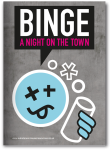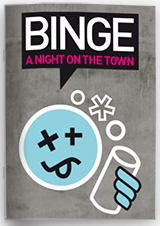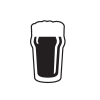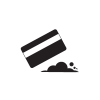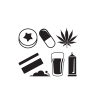This alcohol harm reduction resource will help drinkers of any age understand the risks associated with binge drinking. It provides practical and sensible information and advice about reducing the harm caused by harmful drinking habits.
Latest resources
For most people having a drink can be a positive experience. Having a night out and a laugh with your mates after a long week's work or study helps you to relax and wind down.
Alcohol can help you chill out, make you less shy, and give you extra confidence.
But hammering it every weekend and sometimes during the week can lead to serious short- and long-term health issues.
This booklet will help you think about your drinking and offer practical and sensible information and advice about reducing the harm caused by alcohol.
ALCOHOL
Alcohol is a depressant drug. It's absorbed through the intestines and stomach into your blood and then sent to your brain. It slows down your central nervous system and alters your mood, perception, movement, vision and hearing.
Your body flushes out most of the alcohol through your liver and small amounts in your sweat and breath. A breathalyser measures the amount of alcohol in your system through your breath.
Short-term effects of alcohol
- Short-term effects of alcohol
- Relaxation
- Increased confidence
- Talkativeness
- Anxiety
- Sexual difficulties such as impotence
- Bad judgement, leading to accidents and injuries
- Alcohol poisoning. This could lead to a loss of consciousness and could be fatal
Long-term effects of alcohol
- Cirrhosis of the liver
- Inflamed stomach or pancreas
- Certain cancers such as throat cancer
- High blood pressure
People’s reaction to alcohol can vary and depends on things like
- Age
- Gender
- Body height and weight
- If you have eaten
- How quickly you drink
- If you have used any legal or illegal drugs
BINGE DRINKING
Binge drinking means different things to different people, but generally, it means drinking lots of alcohol over a short period to get hammered.
RISKS AND PROBLEMS
Accidents and violence
Alcohol can make you reckless and impulsive. Binge drinking can lead to an increased chance of falls, car accidents and becoming the perpetrator or victim of violence.
Physical health
Consuming large quantities of alcohol over a short time means your body cannot process the alcohol quickly enough. Alcohol can build up to dangerous levels, and the extra stress on your body's organs can increase the risk of high blood pressure, heart disease and certain cancers.
Alcohol poisoning
Alcohol depresses the nerves that control your breathing and gag reflex (which prevents choking). A fatal dose of alcohol can stop these functions. You could choke to death if you vomit while not conscious because of alcohol.
HOW MUCH DO YOU DRINK?
Alcohol is measured in units. You can calculate the the amount you drink by knowing how many units of alcohol are in your drink.
What is a unit?
A unit is 10ml by amount or 8gm by weight of pure alcohol (Ethanol).
To work out the number of units in a drink, multiply the volume (in millilitres) by %ABV, then divide the result by 1000.
What is %ABV?
ABV means Alcohol By Volume. A 750ml (75cl) bottle of wine with 12% ABV on the label shows that 12% of the liquid in the bottle is alcohol. A 700ml (70cl) bottle of vodka with an ABV of 37/38% on the bottle would contain almost three times the amount of alcohol/units for roughly the same amount of liquid.
Alcohol limits
The suggested alcohol limit for males and females is the same: Don’t regularly drink more than 14 units per week (6 pints of 4% beer, or 6 glasses of 13% wine). These limits will help reduce potential health problems.
If you drink up to 14 units a week, spread these across a few days and have at least two drink-free days a week.
-
Can of lager 440ml
2 units
(Normal strength) -
Small glass of wine
125ml
1.5 units -
Bottle of strong lager
330ml
2 units -
Bottle of wine
750ml
10 units -
Shot 35ml
1.3 units
(Tequila, Sambuca etc) -
Bottle of strong cider
1000ml
9 units -
Standard size bottle of spirits
750ml
26-28 units -
Single pubmeasure ofspirit
25ml
1.3 units
STAYING SAFE
The information in this section will help make your night out as enjoyable and safe as possible.
Pre-loading
A few drinks with your mate to loosen up as you get ready to go out can turn into a session. You are two and a half times more likely to get into a fight or have an accident than people who only start drinking when they go out. You are more likely to be refused entry to a club or pub if you are drunk.
ALCOHOL AND THE LAW
Drunk and disorderly
It is illegal to be drunk and disorderly in public. If you've had a skinful try not to attract attention by acting like an idiot. If the police arrest you, once you are fit to be dealt with, you will typically either be cautioned, be issued with a Penalty Notice for Disorder (PND - £80 fine in ticket form) or, depending on the offence, end up in court.
Drink spiking
Spiking drinks is illegal, even if the person affected is not attacked or assaulted. It can result in a prison sentence of up to 10 years for anyone guilty of doing this.
Drinking outside
It isn't illegal to drink in public, but many areas, such as city centres, have alcohol-free zones, where drinking outside is not allowed. Under-18s can have their alcohol confiscated if they drink outside, no matter where they are.
Entering the pub or club
It is illegal for a pub or club to sell alcohol to someone drunk or conducting themselves in a 'disorderly manner'. It is unlawful for you to refuse to leave licensed premises when asked by the police, the licensee or someone acting on their behalf, such as the door staff.
Pubs or clubs have the right to search anyone entering their premises. If you agree (you have the right to refuse), the search can only be on the outside of the clothes, pockets and inside bags.
MIXING DRUGS AND ALCOHOL
Using drugs or alcohol can make the effects of both very unpredictable. Your body will struggle to cope if you use too many substances, which can rise to dangerous levels.
Alcohol and cocaine used together produce a third toxic substance called cocaethylene, which can increase the chance of seizures, heart attacks and strokes, even in healthy young people. Cocaine will also increase the risk of violent, impulsive, and reckless behaviour.
Alcohol dehydrates you, so mixing it with other drugs that do the same, like cocaine, ecstasy or mephedrone, or some of the newer drugs (formerly legal highs), can be very risky.
VIOLENCE
Alcohol affects the brain and reduces our ability to think straight.
It makes us more likely to misread the signs; someone bumping into you or the 'dirty look' can be seen as an act of aggression when you usually wouldn't even notice it.
The more you drink, the more frustrated you can become; trying to get to the bar or queue to use the toilet can become a flashpoint.
If you lose your temper quickly, try not to get too drunk. Drink in pubs and clubs that are not so busy and avoid trouble hot spots where you know there are always kick-offs.
If you are on the receiving end of someone giving you grief, walk away. It can be hard to lose face in front of other people, but it has got to be better than being the victim of a serious assault or being locked up for giving someone else a hiding.
SEX
Alcohol increases your self confidence and makes it easier to approach someone you fancy, but if you’re too drunk you can end up going further than you intended.
Sexually Transmitted Infections (STI’s)
If you intend to have sex, use a condom. Having sex without a condom can open you to sexually transmitted infections (STIs) and unplanned pregnancies.
Women can get oral emergency contraception from their GP, Brook, or NHS Walk in-centre. It can be taken 72 hours after unprotected sex and is available to anyone over 16.
Brewers droop
Alcohol affects the part of the brain that sends messages that helps with sexual arousal; alcohol suppresses the signals and can lead to brewers droop.
DON’T FLASH YOUR VALUABLES
Don’t flash your expensive phone around, it could end up being stolen. Buy a cheap phone to use when you are going out. If you are drawing cash from a machine be aware of who is around and don’t let anyone distract you, shield your pin and put your money away quickly. Where possible, use a machine in a well lit public area.
DRINK SPIKING
Spiking a drink means putting alcohol or drugs into someone's drink without their knowledge or permission. Following these tips will help you reduce the risks:
- Buy your own drink and watch it being poured if possible.
- Don't accept drinks from strangers
- Never leave your drink unattended
- Don't drink or taste anyone else's drink
- Throw your drink away if you think it tastes odd
- If you think your drink may have been spiked, you should get help from a friend you trust or the venue management.
LOOKING AFTER YOURSELF AND YOUR MATES
If you or one of your friends are going to leave the club or pub with someone you have just met, make sure your friends know what you are up to and where you are going, maybe you could take a pic of your new friend and text it to your friends. If a friend is telling you where they are going and who with, listen to what they are saying.
Feeling unwell
If someone goes too far and starts to feel unwell, take them somewhere quiet and calm. Keep them sitting up and awake, and give them water if they can drink. If you can't wake them and their breathing is erratic, lie them on their side in the recovery position and get medical help.
Getting home safely
Have a plan of how you will get home after a night out.
Try to pre-book and pay for a taxi to take you home from a pre-arranged location. Use this location as a meeting point if you get split up from your friends.
If you end up walking home alone, be aware of your surroundings, stay on well-lit public roads, and don't be tempted to take the shortcut across the dark, deserted park because you can't wait to crash into bed.
CUT DOWN
How often do you say, 'I am never getting that drunk again?' These tips will help you keep that promise during your next night out.
-
Set yourself a limit
Decide how much you will drink and only carry enough money for that number of drinks and your taxi or bus fare home.
-
Eat something before you go out
Having some food in your stomach before you start drinking will help your body release the alcohol at a steadier pace. While you are out, have some bar snacks or maybe eat the kebab halfway through the night rather than at the end.
-
Mix your drinks
Mix your drinks with soft drinks. Have a shandy or mix your wine with soda or lemonade. Or alternate between alcoholic and soft drinks.
-
Miss a round
You don't have to get a drink in every round; when it's your turn to get the drinks, miss yourself out. Or say no and stick to it.
-
Go for lower alcoholic drinks
Some premium lagers, beers and ciders can have almost twice the alcohol content as the normal alternatives.
-
Drink slower
Sip your drink, put it on a table and do something else. Standing with your glass in your hand means you will end up drinking it quicker.
LONG TERM CHANGE
Regular heavy drinking sessions can become a habit. If you need to make long term changes the following advice will help.
Are you drinking too much?
Have a look at this list and see if any of the warning signs apply to you.
- Drinking larger amounts to get the same effect.
- Drinking more than nine units in one session, that’s roughly equivalent to five pints or 9 shorts or nearly a full bottle of wine.
- Have you started doing things you normally wouldn’t do (e.g. missing work or college, letting people down)?
- Do friends and family have a go at you about the amount you drink?
- Have you got into bother, or injured yourself or others after drinking?
If one of these applies to you then you might want to cut-down your drinking. If three or more of these apply to you then you may need help or support before you start to cut down or stop drinking. You can find more help on the back page of this booklet.
Think about how will you benefit from cutting down on drinking
There are lots of benefits to cutting back on the drinking sessions and for everyone they will be different.
Some benefits might be:
- Feeling less tired
- Losing weight
- Having more money to spend on other things
- Better relationships with friends and family
- Healthier and less likely to develop serious health issues
Plan ahead and set your goals
Are you going to cut-down slowly or stop straight away? Think about how and when you are going to start.
You could make a decision to book your taxi home earlier than normal. Maybe just go to the local rather than going clubbing. Or choose a couple of days to be completely alcohol free.
Think about difficult situations and how to deal with them
Think of the situations you are in last time you got smashed, who were you with, where were you, how did you feel, what where you doing at the time? Situations that could trigger your drinking could be:
- The end of a stressful day
- After work
- Celebrating at a party or a club
- Needing to relax
- Feeling down
Dealing with difficult situation
Stay active
Plan activities for the times you used to spend drinking. If you are getting bored, stressed, or craving a drink, do something, the feelings will pass.
Do something new
Start a new hobby or enrol on a course. It will occupy your mind, stop you getting bored and fill the time you used to spend drinking.
Look after yourself
Stick to a healthy diet, try to get as much sleep as you can, drink plenty of water and try to get some exercise, this will help make you feel better.
Avoid your friends who drink heavily for a while
Some of your drinking friends can act as a trigger to your drinking sessions.
Clear your home of any alcohol
No need to keep temptation within arms length.
Tell your friends or family what you are about to do
Having support and someone to talk to will make it easier to achieve your goals. You can also get help and support from your local GP, nurse or support service. There are some contact details on the back page.
Keep going
Don’t worry if you don’t succeed the first time you try. Don’t beat yourself up if this happens, you haven’t failed, you have just taken the first step. Try again - it will probably be a bit easier next time.
Other sources of binge drinking information and advice you may find useful.
-
Binge drinking - NHS:
-
Binge drinking - Drinkaware:
Free to use
- Only use this harm reduction information for non-commercial purposes
- Link to, or credit the Substance website
- Let us know where you used the information
